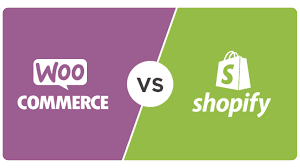Introduction
Choosing the right platform is very important in setting up an online shop. And two of the most powerful eCommerce platforms today are WooCommerce and Shopify. Whether you’re a complete starter or someone planning to migrate from one platform to another, this guide from RexterTech will help you decide based on your own business needs.
We’ll cover everything from ease of use, customization, and pricing to SEO capabilities, payment gateways, and scalability, all in a human-friendly way, non-technical.


What Are WooCommerce and Shopify?
Wide and Free: WooCommerce
WooCommerce is a potent eCommerce plugin that runs under WordPress. It is open source, giving some techies unlimited license to modify any part of a store structure. This is very suitable for people wishing to have full control over their website and are willing to carry out some backend development.
Shopify – All-in-one SaaS Platform
Shopify is a hosted eCommerce solution. It’s simple to build; it does everything out of the box, including hosting, security, and support. It is best suited for those business owners who want to put up a store and start selling quickly without caring about code or maintenance.
WooCommerce vs Shopify: Detailed Comparison
1. Ease of Use
Shopify is a beginner-oriented platform, as it is plug-and-play and has a simple interface.
WooCommerce requires technical know-how from the start through installation and updates.
Verdict: If you want to set up an online store quite quickly with no coding at all, go with Shopify. If you are comfortable with a WordPress site, then WooCommerce would be a better option for you.
2. Design & Themes
Shopify has above 100 professionally made themes (some free, some paid).
With WooCommerce, you can choose from hundreds of themes on WordPress, including custom ones.
Verdict: Flexibility goes to WooCommerce. Simplicity and polish go to Shopify.
3. Customization & Flexibility
Being an open-source platform, WooCommerce grants you the total freedom to customize everything, from checkout flow to backend logic.
Shopify grants rather limited customization unless it is for Shopify Plus (enterprise).
Verdict: If you want total control, go with WooCommerce. Shopify is easier but does have its restrictions.
4. Plugins & Apps
For all plugin options, WooCommerce has more than 55,000 plugins listed in the WordPress repository.
Shopify has an app store with thousands of options, many with monthly fees.
Verdict: If you are savvy about plugins, WooCommerce is more flexible and economical. Shopify is more streamlined.
5. SEO Capabilities
WooCommerce gives you a free hand in customizing all SEO variables (custom URLs, metadata, sitemaps, etc.).
Shopify does well on its SEO basics but has its own limitations (like inflexible URL structure).
Verdict: WooCommerce has an upper hand due to long-term SEO control, especially paired with RankMath or Yoast.
6. Pricing
WooCommerce Pricing:
- Free plugin (but you pay for hosting, SSL, domain, themes, etc.)
- Can be cost-effective when used with the right combination
Shopify Pricing:
- Basic plan starts at $39/month
- Extra transaction fees for transactions not processed through Shopify Payments
- Most useful apps are paid apps
Verdict: Awesome stand-woo may be cheap, but it requires more setup effort. Shopify is a fixed monthly cost for convenience.
7. Payment Gateways
WooCommerce grants support to PayPal, Stripe, Razorpay, PayU, etc., with no fees applied.
Shopify supports varying gateways but might impose extra fees unless Shopify Payments is used.
Verdict: A clear check in WooCommerce’s favor-that is based on liberty with no transaction penalties.
8. Security
Shopify takes care of all security-SSL, PCI compliance, and backup, among others.
In terms of security on WooCommerce, you must take care of yourself by installing plugins and managing hosting needs.
Verdict: Shopify provides better security for someone who wants set-it-and-forget-it security. WooCommerce requires active management.
9. Support
When it comes to support, Shopify is rated 24/7 through live chat, phone, and email.
Support for WooCommerce will depend on the hosting provider chosen, the authors of the theme/plugin used, and the community forums.
Verdict: Shopify wins thanks to more centralized support. On the downside, WooCommerce leaves you with unpredictable support from several different third-party providers.
Use Case Scenarios
WooCommerce is for:
- Continued use of WordPress
- Complete control and scalability
- You would prefer a one-time investment rather than an ongoing monthly payment
- You have a knack for self-hosted solutions, or at least have a tech-whiz partner to turn to
Shopify is for:
- The fast, simple setup you seek
- Not dealing with the upkeep of technical maintenance
- 24/7 support and built-in features valued
- You don’t mind paying a monthly fee instead of a one-time investment.
How RexterTech Can Help You Decide
At RexterTech, we do not only build websites; we build scalable digital commerce experiences.
Our team of professionals can assist you, from WooCommerce to Shopify, with:
✅ Business needs analysis
✅ Best recommendation on which platform to use
✅ Building, launching, and scaling the store
✅ Marketing services and support after the launch
Still unable to make a decision? Today, get in touch with us for a complimentary consultation!
Final Verdict: WooCommerce vs Shopify
Both platforms are excellent – it all comes down to your business needs, budget, and technical preferences.
Want full control, flexibility, and cost savings? ➤ Go with WooCommerce
Want ease of use, speed, and support? ➤ Choose Shopify



